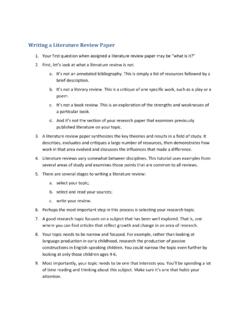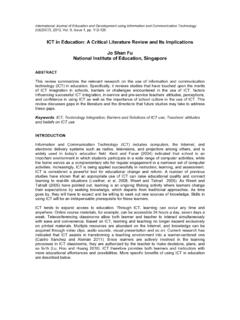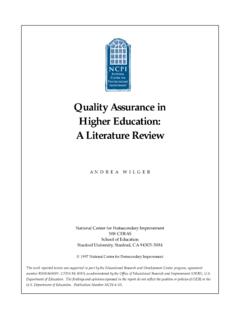Transcription of Investigating problems of English literature teaching to ...
1 Available online at JOURNAL OF LANGUAGE AND LINGUISTIC STUDIES. ISSN: 1305-578X. Journal of Language and Linguistic Studies, 13(2), 82-95; 2017. Investigating problems of English literature teaching to EFL high school students in Turkey with focus on language proficiencyi Ceren I kl a* , Asl .Tarak o lu b a Ahmet Yesevi Anatolian High School, Alt nda , Ankara 06080, Turkey b Gazi University, Yenimahalle, Ankara 06560, Turkey APA Citation: I kl , C., & Tarak o lu, A.. (2017). Investigating problems of English literature teaching to EFL high school students in Turkey with focus on language proficiency. Journal of Language and Linguistic Studies, 13(2), 82-95. Submission Date: 13/01/2017. Acceptance Date: 29/07/2017. Abstract Introduction of English literature as a separate school subject into Turkish high school curriculum has revealed a huge number of problems during its practical applications: students low levels of proficiency in English , teacher incompetence, low motivation , lack of confidence, limited resources, lack of materials etc.
2 Given the great extent and multi-sided dimension of the new experience, with the constant interference of a variety of external factors, the focus of this study was narrowed down to identify mainly the primary source of problems in EFL- contextualized English literature teaching . To this purpose, two instruments of data collection were used: a teacher questionnaire and English language proficiency test. Analysis of the questionnaire has revealed that, according to English teachers, student-related problems , and particularly students low proficiency levels, constitute the most important source of problems . The language proficiency test was applied to see whether this finding confirmed or not the teacher opinion about low proficiency levels of students.
3 The test has revealed students real levels of proficiency in compliance with the Common European Framework of References for Languages (CEFR). It showed that about half of the students proficiency levels were significantly lower than expected, in this way partly confirming the teacher opinion on low proficiency levels, as the proof of the general inadequacy of students for studying English literature at levels prescribed by the national curriculum. The study has been led to conclude that there is an urgent need to re-adjust English literature curriculum so as to take into account students real levels of proficiency, and to review or reconsider it in such ways as to prioritize linguistic competence development over the literary.
4 2017 JLLS and the Authors - Published by JLLS. Keywords: English literature teaching ; student-related problems ; English language proficiency; linguistic and literary competence; curriculum development 1. Introduction Course designers always have to reflect upon issues that are likely to have effect on the practical implementations of what they design. In this respect, in the case of English literature course, designed for study by EFL students, it is important to see if students proficiency levels in English comply or *. Corresponding author. Tel.: +0-543-932-2709. E-mail address: . Ceren I kl , Asl .Tarak o lu / Journal of Language and Linguistic Studies, 13(2) (2017) 82-95 83. not with the curricular standards in order to ensure the sustainability of the program.
5 Among the problems in EFL literature teaching - low motivation , lack of confidence, inadequate teaching methods, exam stress, underqualified teachers, insufficient in-service training - students proficiency levels have been always standing out as the most critical (Abdullah, T. et al, 2007; Arvidson &. Blanco, 2004; Buyukyavuz & Inal, 2008; Brown, 2000; Cetintas, 2010; Ganakumaran, 2002; Karci &. Vural, 2011; Katz, 2001; Krishnasamy, 2015; Mwape, 1984). According to Krishnasamy (2015), unless the program reflects students real levels of proficiency it risks producing a mismatch between the text selected and students language ability which would inevitably have a negative effect on the course implementation ( ). Certainly, there is no doubt that students should have sufficient command of English to ensure they can keep up with the pace and workload of the English literature program.
6 After all, English literature is a serious academic discipline. The contention rises when decision-making is required on the issue of what should be the proficiency levels of students to make them eligible to study English literature . Kapinga (quoted in Mwape, 1984, ) conducted a research on EFL high school students in which she described her students as being seriously anxious about learning English literature which they perceived as too difficult to comprehend and understand independently without the assistance of their teachers . Kapinga suggests that the study of English literature should be pre-conditioned by the mastery of English language itself . The similar views go even as far as to suggest that English literature should be studied exclusively by students well advanced in English , and not by beginners.
7 Nevertheless, considering the widespread popularity, for various reasons, of English literature all over the world, and particularly in EFL contexts, it is not likely that such radical views will be ever accepted and applied. Quite on the contrary, there is a prevailing opinion in line with Mwape s (1984) argument that English literature should be accessible to all students in school because it is not always contingent upon student s proficiency in English ( ). The scholar remarks that the weak L2 student probably needs literature more than the more proficient L2 learner and that the solution to the dispute of linguistic barriers lies simply in making English literature curricula avoid prescription of books beyond the average student s ability ( ).
8 English literature , it is argued, is immensely resourceful and can provide for any level of proficiency: beginner, intermediate or advanced. In Turkey, the levels of high school students proficiency in English are predetermined by the national curriculum for English language produced by the Ministry of National Education. In compliance with the principle of continuity, Turkish students, passing from primary to secondary education, are expected to pass from A2 to B1 level according to the generally recognized CEFR. standards. However, no study has undertaken so far to look into whether high school students in Turkey are really B1 proficient and capable to undertake a study of English literature required for this level.
9 In addition to proficiency levels, while motivation and self-confidence are considered important aspects in terms of their effect on student performance, field knowledge and teacher training are equally important in terms of their effect on teacher performance. In a study by Katz (2001), English teachers thought themselves professionally incompetent in teaching English literature , blaming for this the pre-service training they had received for its primary focus on English language teaching in disregard of English literature . Ganakumaran et al (2003) assert that teachers lack of training in English literature bears responsibility for the failings in curricular implementations. Keeping in same vein, Karci and Vural (2011) argue that, let alone English literature , teachers often do not even think to be qualified to teach English language, hence, Turkish students poor command of English language.
10 Cetintas (2010) further contributes to the debate remarking on the deplorable state of in-service training courses for English teachers which explains the poor quality of English studies in Turkey. 84 Ceren I kl , Asl .Tarak o lu/ Journal of Language and Linguistic Studies, 13(2) (2017) 82-95. Research questions In the light of the above statement of the problem, the study seeks to provide answers to the following questions: 1. What is the most serious problem of English literature teaching to Turkish high school students from the point of view of English teachers? 2. Are Turkish high school students really B1 proficient as required according to the national curriculum? 2. Method Sample / Participants The present study was conducted on 108 English teachers employed at state Anatolian High Schools (AHS) in seven regions of Turkey, as shown in Table 1, and on 131 students of 9th grade (class A and class B ) at two state Anatolian High Schools in Ankara, as shown in Table 2.













